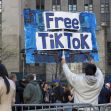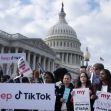TikTok has voiced strong opposition to a bill passed by the U.S. House of Representatives. The bill aims to ban the app unless its Chinese owners, ByteDance, divest their stake within a stipulated timeframe. The bill cleared the House with a significant majority of 360 to 58 and is now poised for consideration in the Senate. President Joe Biden has indicated he would sign the legislation, heightening concerns around the future operation of TikTok in the U.S.
The legislation integrates TikTok into a broader foreign aid package, a strategic move that could expedite a potential ban. This development follows the stalling of a previous bill in the Senate aimed at a similar prohibition. TikTok criticized the measure as an infringement on the free speech rights of its 170 million American users, framing the legislation as a misuse of significant legislative measures for other priorities.
In response to the bill's progression, TikTok reiterated its stance that it has never shared U.S. user data with the Chinese government and does not intend to. Despite these assurances, bipartisan U.S. lawmakers and the Biden administration express ongoing concerns regarding national security risks, suggesting that Chinese authorities could compel ByteDance to surrender user data.
Democratic Senator Mark Warner, chairman of the Senate Intelligence Committee, emphasized the potential for TikTok to serve as a propaganda tool and a source of data harvesting by the Chinese government. This stance aligns with broader anxieties over foreign influence and data security involving major tech platforms.
Conversely, the American Civil Liberties Union and some Democratic representatives have opposed the bill on the grounds of free speech, arguing for enhanced data privacy legislation over an outright ban. Representative Ro Khanna expressed skepticism about the bill's constitutionality, suggesting that it might not withstand legal scrutiny due to free speech protections enshrined in the U.S. Constitution.
The Knight First Amendment Institute at Columbia University also critiqued the bill, arguing that it fails to address the broader issue of data privacy and disinformation, which can still be propagated through other means and platforms.
Potential First Amendment Concerns with Proposed TikTok Ban
The proposed legislation to ban TikTok unless its Chinese owners divest, raises substantial First Amendment concerns. Critics argue that such a ban could infringe upon free speech rights protected under the U.S. Constitution. The First Amendment protects the freedom of speech, press, and assembly, which are foundational to the functioning of a democratic society. These rights are not only essential for individual expression but also for the free flow of information and ideas.
1. Freedom of Expression: TikTok serves as a platform for over 170 million Americans to express themselves, share their views, and engage in cultural and political discourse. Banning the app could be seen as a restriction on their ability to communicate and express themselves freely in the digital age. This could set a concerning precedent for government control over other digital platforms and social media.
2. Access to Information: For many users, especially younger demographics, TikTok is a significant source of news and information. Limiting access to TikTok might restrict the ways in which a large portion of the population can receive information, potentially skewing the public discourse and the diversity of perspectives that are accessible.
3. Overbreadth and Vagueness: Legal challenges could also arise from the potential overbreadth and vagueness of the legislation. If the law is not narrowly tailored to address a specific and substantial government interest, it could be seen as overly broad, impacting more speech than necessary. Furthermore, if the law is vague and does not clearly define what constitutes sufficient divestiture or the specifics of prohibited activities, it could lead to arbitrary enforcement, which is another point of conflict with First Amendment principles.
4. Prior Restraint: Imposing a ban before any actual misuse of data or other malicious activities is proven might be interpreted as a form of prior restraint, which the First Amendment generally prohibits. This principle prevents the government from banning speech or expression before it actually occurs, based on the anticipation of harm.
Critics like the American Civil Liberties Union and certain lawmakers argue that such sweeping actions against TikTok need to be carefully considered and balanced against the fundamental rights guaranteed by the Constitution. They advocate for a more focused approach to addressing specific data privacy concerns through targeted legislation rather than a broad ban, which could have wide-ranging implications for free speech.
National Security Considerations in Balancing First Amendment Rights
While the First Amendment safeguards free speech and expression, these rights have their limits, especially in cases involving national security where the government may justify certain restrictions. The proposed TikTok ban, motivated by substantial national security concerns, is believed by lawmakers to potentially outweigh the First Amendment issues it raises.
The U.S. government views the protection of national security as a compelling interest that can justify restrictions on constitutional rights. In the case of TikTok, there is concern that its Chinese parent company, ByteDance, might share user data with the Chinese government under local laws that compel cooperation with intelligence activities. This data could include sensitive personal information of millions of U.S. citizens, presenting a clear national security threat.
To justify restrictions affecting First Amendment rights, the government must demonstrate that these measures are the least restrictive means to achieve security goals. The proposal to force TikTok's divestiture or outright ban is seen as necessary due to the impracticality of less invasive measures that would sufficiently guard against foreign control over vast amounts of American data.
Proponents of the ban may cite historical precedents where national security concerns have overridden civil liberties, such as during wars or espionage cases. They might also refer to similar actions against other foreign-owned entities deemed security risks, emphasizing the government's longstanding role in regulating foreign influences that threaten domestic safety.
From a practical perspective, regulating TikTok’s operations within the U.S. to mitigate risks might be seen as ineffective or impractical. If monitoring and ensuring compliance by a foreign-owned company is not feasible without extensive oversight, proponents argue that a ban or forced divestiture becomes a necessary step to eliminate the risk entirely.
Ultimately, the national security argument seeks to prioritize public safety and welfare. While freedom of speech and expression is crucial, the protection of the nation's digital infrastructure and the privacy of its citizens can justify stringent measures.
The outcome of the proposed legislation is highly debated among pundits, analysts, and legal experts, with many factors influencing potential scenarios:
Bipartisan Support: The bill has significant bipartisan support, enhancing its chances of passing in the Senate.
Presidential Approval: President Biden's support suggests a higher likelihood of the bill becoming law.
Legal Challenges: The legislation is expected to face legal challenges that could affect its implementation, depending on judicial interpretations of the balance between national security and constitutional protections.
Public and Corporate Reaction: Public and industry reactions could influence legislative modifications or enforcement practices.
International Relations: U.S.-China diplomatic dynamics may also affect the legislation's progression and enforcement.
Given the current political climate concerning China and cybersecurity, the legislation is generally expected to pass, but judicial reviews and potential adjustments in response to public and international reactions could prolong its final outcome. The situation remains fluid, with significant uncertainties affecting both the legislative process and potential legal battles.






